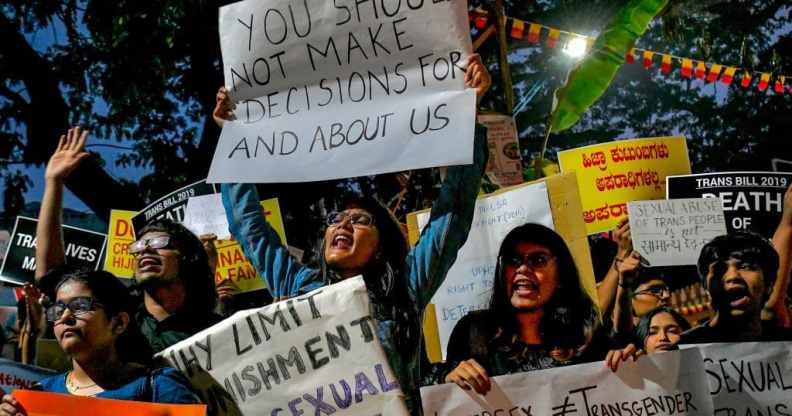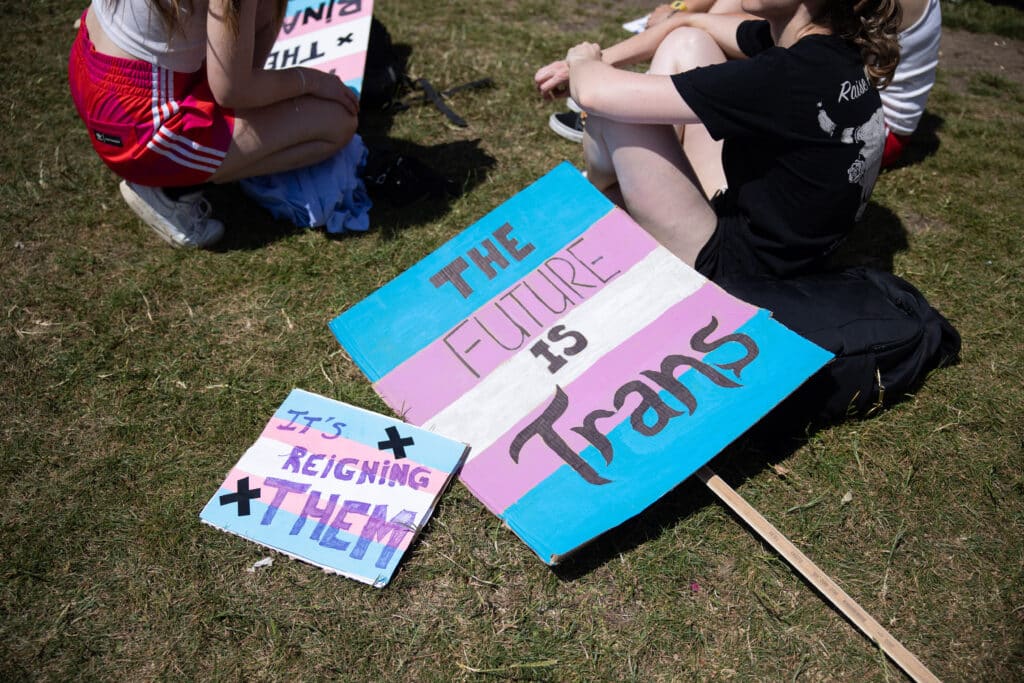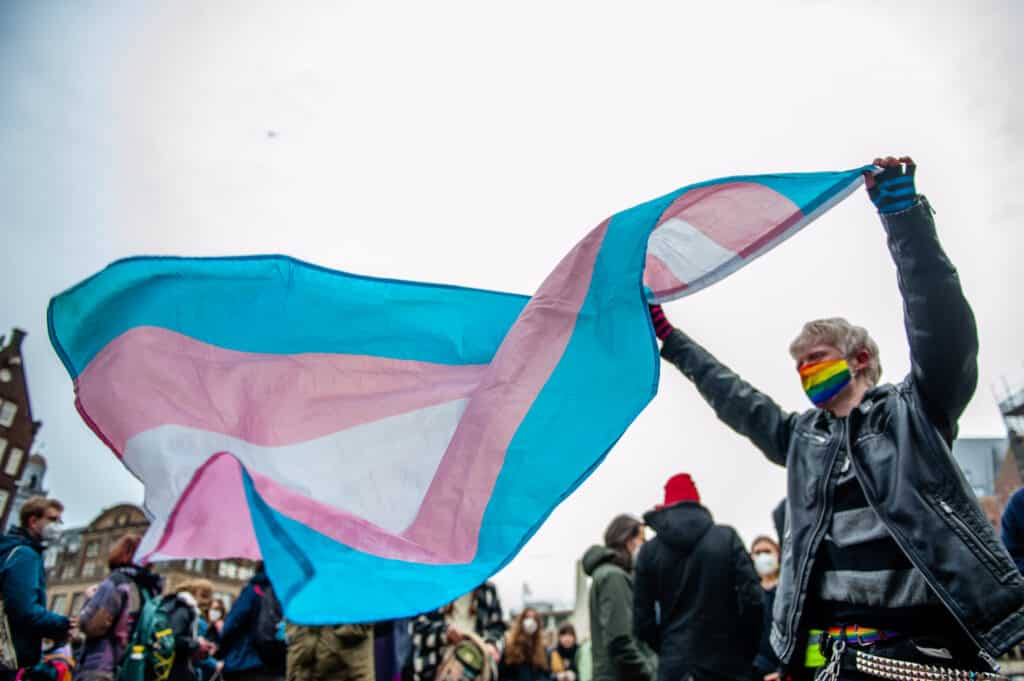Trans man who fled abusive family forced back home by police in India

A trans rights protest in Bangalore, India in 2019. (Getty)
Police in Uttar Pradesh removed a vulnerable young man from a shelter for trans people, forcing him back into his abusive family home.
When Aditya, a 22-year-old trans man, was served food for the first time at a shelter home for trans people in India’s capital New Delhi, he cried profusely.
Aditya had escaped his abusive family home, in a village in the state of Uttar Pradesh, and arrived at the shelter home scared and starved on 18 July.
Three days later, 21 July, a joint team of Uttar Pradesh Police and Delhi Police picked up Aditya from the shelter home and deposited him back with his family.
Delhi Police also assaulted other transgender residents of the shelter when they protested the late night operation. The police had no official warrant to enter the premises, did not follow the documentary procedure of the shelter home, and did not take Aditya’s consent in writing at that time, according to the shelter.
The shelter home for trans persons is run by a non-profit organisation under a scheme by India’s Ministry of Social Justice and Empowerment.
There are 12 such pilot shelter homes operational in nine states of India which offer a safe space to trans persons above age 18 years, escaping violence and discrimination from their families and society.
The incident, however, has reinforced the belief that trans persons are not safe anywhere.

A trans right protest. (Hesther Ng/SOPA Images/LightRocket via Getty Images)
“When law enforcement agencies are flouting the law and helping families oppress trans persons, where will we go?” asked Rudrani Chettri, a trans woman and founder of Mitr Trust, the non-profit organisation which runs the shelter home.
Speaking to PinkNews, she added: “Aditya told us he was confined in a room for days by his family. He knew they will come after him and was scared for his life.”
Uttar Pradesh Police claimed that Aditya had given them a statement that he was now comfortable living with his family.
They refused to provide home address or contact number of the family members, and insisted on misgendering him.
“[He] was inclined to be a man and had befriended a doctor on Instagram who prescribed her some gender-altering hormone medicines,” said Shivani Sharma, a police officer who was part of the Uttar Pradesh police team which picked up Aditya.
“We have not registered any criminal case in the matter as the person went on her own accord and returned willingly.”
Chhetri asked: “How can we believe the police that Aditya is safe and comfortable when they picked him up at the dead of night without following any of the legal procedures?”
“They should have taken the written statement in front of us,” she added. “We have had parents of residents coming over earlier as well to get them back home. In such cases, we always do family counselling to help them understand the gender identity issue.
“Some of them also get impressed by the facilities available here as the residents are learning new skills like basic computers and spoken English, in a safe space. But for this to happen, police have to follow a procedure.”
Trans men are invisible in India
Queer persons, especially visibly trans persons, in India are vulnerable to physical abuse, sometimes leading to murder, by family members who want them to act according to the gender they were assigned at birth.
Trans men and lesbians endure greater violence because of the patriarchal tradition of deriving family honour from the conduct of its women. Abuse may include rape from relatives as a corrective therapy. A research study published in the Journal of Interpersonal Violence found that high number of college students from Pakistan and India considered same-sex relationships as damaging to family honour and also endorsed anti-gay abuse.
Trans men are a highly invisibilised and marginalised group within the larger queer community in India. While trans women have role models in popular culture besides a long socio-cultural tradition of feminine queer identities such as kinner or hijra persons, similar affirmations are missing for trans men.
Aman, 22, from the Ferozepur town in the state of Punjab, was at loss of words when his aunt’s family asked if he could point out anyone who was like him.
“The truth is I had not seen any trans man in my small town,” he said. “It seemed like I am the only one with this desire to dress and behave like a man.”
Aman was dependent on his aunt’s family after his mother and grandmother passed away. His life was, however, confined to their house.
“They would not take me along when going out unless I dressed like a woman. I would refuse and hence ended up being at home all the time,” Aman recalled.
“It was only when I got access to a mobile phone and internet that the world of trans identities opened up for me.”

(Ana Fernandez/SOPA Images/LightRocket via Getty Images)
Aman left his aunt’s place without informing them and arrived at a shelter home for trans men run by a non-profit in New Delhi. “Here, I have met more people who feel like me and escaped the attempts by their family members to make them behave like a woman.”
The staff at the shelter home affirmed that its location is not widely circulated on social media to avoid trouble for the residents whose family members might trace them there.
Aafter his failed attempt to be himself, Aditya will face greater curbs at home despite being an adult, thanks to the transphobic operations of law enforcement agencies in India.
A news report appearing in Dainik Jagran, one of the Hindi newspapers with largest circulation in the country, used information put out by the police and called Aditya’s trans identity an undesirable fetish.
It also claimed that he had been influenced by Instagram and asked parents to monitor their children’s use lest they also fall into “bad company”.
When the Indian Supreme Court decriminalised consensual sexual relations between adults of any gender in 2018, it also directed that all government officials, especially the police, be given sensitisation and awareness training. While some non-profit organisations do hold such trainings occasionally, there has been no attempt to institutionalise them.
Manu Moudgil is an independent journalist based in India. He tweets at @manumoudgil

